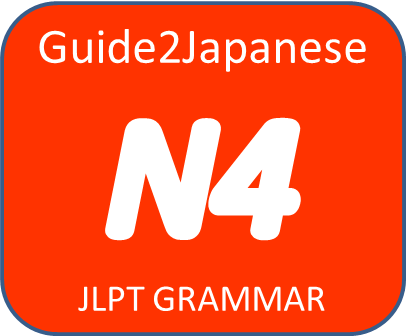JLPT N4 GRAMMAR: そんけいご (sonkeigo)
尊敬語 are the 敬語(Polite expressions) which are used to describe the listener or the person referred to, as well as things connected with him/her and his / her action with respect.
There are respectful verbs used in 尊敬語 and are same verbs used in 受け身形(Passive Verb) .
Example sentences:
- 中村さんは7時に来られます。
- Nakamura-san wa 7-ji ni ko raremasu.
- Mr. Nakamura will come at 7.00.
- श्री नाकामुरा 7 बजे आयेंगे।
- お酒を辞められたんですか。
- O sake o yame rareta ndesu ka.
- Have you given up drinking?
- क्या आपने शराब पीना छोड़ दिया?
- 京都へ行かれますか。
- Kyōto e ika remasu ka.
- Shall you go to Kyoto?
- क्या आप क्योटो जा रहे हैं?
Pattern: お+ます形+になります。
This pattern is considered politer than the respectful verbs mentioned above. Verbs whose ます form consists of one mora (みます、ねます、etc) and group III verbs can not be used in this pattern.
- 社長はもうお帰りになりました。
- Shachō wa mō o kaeri ni narimashita.
- The president has already left for home.
- राष्ट्रपति पहले ही घर के लिए निकल चुके हैं।
Special respectful words: Some verbs have special respectful equivalents. They are considered to show the same level of respect as お+ます形+ください。
| 動詞 | 尊敬語 |
| いきます きます います | いらっしゃいます |
| たべます のみます | めしあがります |
| いいます | おっしゃいます |
| しっています | ごぞんじです |
| みます | ごらんになります |
| します | なさいます |
| くれます | くださいます |
Note: いらっしゃいます、なさいます、くださいますand おっしゃいます are Group I verbs, but expect for the ます-form, they change their form in the ら-row when they conjugate.
- 「ワット先生はテニスをなさいますか。」「…いええ、なさらないと思います。」
- `Watto sensei wa tenisu o nasaimasu ka.’`… Ie e, nasaranai to omoimasu.’
- “Does Professor Watt play tennis?” “… No. I didn’t think so.”
- “क्या मिस्टर वाट टेनिस खेलते हैं?” “… नहीं, मुझे ऐसा नहीं लगता।”
- ワット先生は研究室にいらしゃいます。
- Watto sensei wa kenkyūshitsu ni irasshaimasu.
- Professor watt is in Lab.
- प्रोफेसर वाट लैब में हैं।
- どうぞ召し上がってください。
- Dōzo meshiagatte kudasai.
- Please help yourself.
- कृपया इसका आनंद लें।
- 部長は 何時に いらっしゃる。
- Buchō wa nanji ni irassharu.
- What time will the General manager come?
- प्रबंधक कितने बजे आयेंगे?
Pattern: お+ます形+ください。
This is the respectful way of instructing or inviting someone to do something.
Note: The special words mentioned above cannot be used in this pattern. The exception are めしあがり and ごらんになります which are changed to おめしあがりくださいand ごらんくださいrespectively.
- あちらからお入りください。
- Achira kara ohairikudasai.
- Please enter from over there.
- कृपया वहाँ से प्रवेश करें।
Nouns, adjectives and adverbs can be turn into 尊敬語 by attaching お or ご to the front of the word. お is attached to the word of Japanese origin while ご is attached to the word of Chinese origin.
Example of words to which お is attached.
- 名詞:お国、お名前、お仕事
- なー形容詞:お元気、お上手、お暇
- いー形容詞:お忙しい、お若い
Example of words to which ご is attached.
- 名詞:ご家族、ご意見、ご旅行
- なー形容詞:ご熱心、ご親切
- 副子:ご自由に
- 部長の奥様もご一緒にゴルフに行かれます。
- Buchō no okusama mo goisshoni gorufu ni ika remasu.
- The General Managers wife will go golfing together with him.
- मैनेजर की पत्नी भी साथ में गोल्फ जाएगी।
Pattern: ~まして
You change て-form to ます- form まして when you want to be very polite. In a sentence with けいご, まして is often used for consistency.
- ハンスが昨夜熱を出しまして、今朝もまだ下がらないんです。
- Hansu ga yūbe netsu o dashimashite, kesa mo mada sagaranai ndesu.
- Hans has become feverish last night still has a fever this morning.
- हंस को शाम को बुखार था, और यह आज सुबह भी नहीं ऊतरा।



